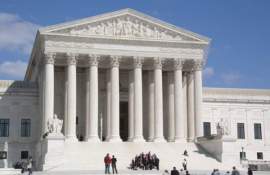
An Overview to a Constitutional Government

Popular In Constitution
Purpose Of Lifetime Appointment And Pros And Cons Enumerated Powers Bicameral Legislature Background Article 3 Of The Constitution We The People 1st Amendment Who Wrote The Constitution Judicial Review Equal Protection Clause 5th Amendment 10th Amendment Three Fifths Compromise
The Treaty of Paris signifies the first official doctrine regarding foreign policy and diplomacy between the newly-formed United States of America and all other foreign nations. As a result of treatment of the Colonists under the British monarchy, treatment which the authors of the Treaty of Paris regarded as both unfair and unjust, the Treaty of Paris was penned in the hopes of establishing a forum to conduct a just system fueled by democratic and humane diplomacy.
The Treaty of Paris sought to address potentially harmful situations in which international turmoil might occur. With that in mind, the Treaty of Paris establishes solidified borders and boundaries, which delineated the property of the United States of America from that of other nations. In addition, the British loyalists who remained on American soil and had been bullied in the wake of the Revolutionary War, both those taken prisoners, as well as those unjustly stripped of their property, were returned their respective property and freedom.
As a result of the Articles of Confederation’s movement away from a strong gubernatorial presence, the Northwest Ordinance was one of the few legislative aspects over which the central Government was allowed control. After defeating the British in the Revolutionary War, the Continental Congress - as well such political figureheads such as Thomas Jefferson - were anxious to expand the borders of the newly-formed United States of America. As a result, Thomas Jefferson penned the Northwest Ordinance in July of 1787.
The focal point of the doctrine was to not only ensure that settlers participating in the westward expansion would be entitled to the same rights and liberties as those residing in the 13 states, but was also to allow room for new states to enter the Union. Contrasting the American citizens’ sentiment of abandonment at the hands of the British monarchy under Kind George II, the Northwest Ordinance ensured that settlers would be protected while colonizing the western frontier.
On June 12th, 1776, the Articles of Confederation was assigned to be drafted by a committee put together by the Second Continental Congress. John Dickinson, the appointed head of this drafting committee, had already gained some notoriety as a result of his initial public refusal to sign the Declaration of Independence. Dickinson had concluded that the Declaration of Independence removed too much power from the Government.
Though Dickinson drafted an initial version of the Articles of Confederation which ensured the existence of a strong central government, as well as equal representations amongst the states, the remainder of the committee modified the Articles of Confederation prior to sending it to the individual states for ratification. In that final version, the central Government was disallowed any jurisdiction over any statewide legislation. The central Government was permitted to regulate currency, appoint both a military and postal service, and manage affairs with the Native Americans. However, the flawed legislative structure established in the Articles of Confederation quickly lead to both financial disarray, as well as an evident disharmony between the states of the Union.
Daniel Shay was a working-class farmer residing in Massachusetts who led a rebellion against a sovereign Massachusetts State Government between 1786 and 1787. Due to the central Government's inability to levy taxes - a precept outlined in the Articles of Confederation - the sovereign states could only be requested to make financial contributions to the central Government. This quickly devastated the central Government’s finances.
Foreign landowners and investors with property in Massachusetts demanded a prompt repayment of all debts. Due to the depletion of their State funds as a result of the inflation spawned by the central Government, the Massachusetts State Government was forced to employ exorbitant tariffs on interstate commerce. Because farmers and merchants relied on the commercial market as their sustenance, they were quickly subject to imprisonment and foreclosure.
Shays declared these State-imposed tariffs to be both unjust and undemocratic and, in turn, refused payment. He and his fellow merchant-farmers rebelled against the Massachusetts State Government, and by doing so he was considered to bring the innate inefficiency of the Articles of Confederation to light.


















